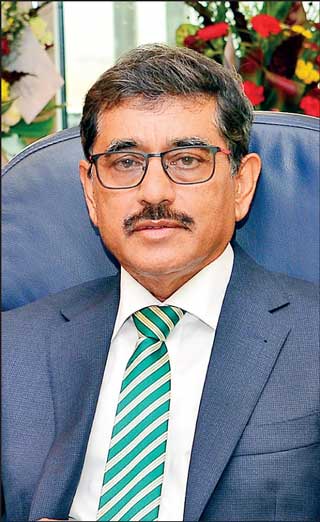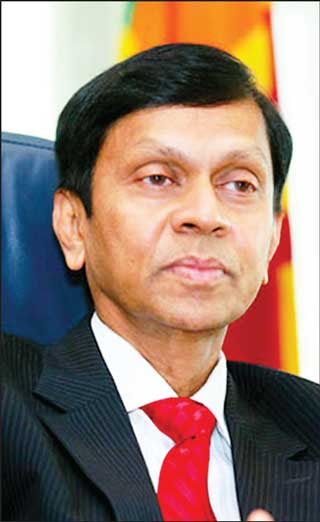Monday Feb 23, 2026
Monday Feb 23, 2026
Wednesday, 27 April 2022 00:00 - - {{hitsCtrl.values.hits}}
By Senehe Perera
It is learned that the former Governor of the Central Bank Ajith Nivard Cabraal has stated that he is not
 |
| Central Bank Governor Dr. Nandalal Weerasinghe |
 |
| Central Bank former Governor Ajith Nivard Cabraal |
accountable to the decisions taken in the recent past which have led to the present economic crisis of Sri Lanka. It is distressing that it appears that there is no one accountable to the citizenry of Sri Lanka for the erroneous decisions taken which have resulted in the present crisis.
At present, there appears to be a serious legal issue relating to the decisions taken by the Monetary Board in view of the fact that the present Monetary Board is not properly constituted.
Under the provisions of Section 8 of the Monetary Law Act, the composition of the Monetary Board is as follows:
Constitution of Monetary Board
(1) The Monetary Board of the Central Bank shall, in addition to determining the policies or measures authorised to be adopted or taken under this Act, be vested with the powers, duties and functions of the Central Bank under this Act, and be generally responsible for the management, operations and administration of the Bank:
Provided, however, where the Monetary Board considers it appropriate, it may delegate to the Governor, or to any officer of the Central Bank or to a Committee of such officers, any power, duty or function conferred or imposed on, or assigned to, the Board by Section 10(a), (b), (bb), (d) and Section 27.
(1A) Where any power, duty or function is delegated by the Monetary Board under subsection (1), the person or the group of persons to whom such power, duty or function is delegated shall exercise perform or discharge such power, duty or function, in accordance with such general or special directions or guidelines as may be issued by the Monetary Board.
(2) The Monetary Board shall consist of –
(a) the Governor of the Central Bank who shall be the chairman of the board;
(b) the person holding office for the time being as Secretary to the Ministry of the Minister in charge of the subject of Finance; and
(c) three members appointed by the President on the recommendation of the Minister of Finance, with the concurrence of the Constitutional Council.
(3) In the absence of the Governor from any meeting of the Monetary Board, the Deputy Governor designated as Senior by the board shall act as his alternate and shall preside at the meeting and have the right to vote thereat.
(4) In the absence of the member of the Monetary Board mentioned in paragraph (b) of subsection (2) from any meeting of the board, the person holding office for the time being as Deputy Secretary to the Treasury shall act as that member’s alternate at the meeting and have the right to vote thereat.
As at 31 March 2022, Composition of the Monetary Board is as follows:
Ajith Nivard Cabraal
Governor
S.R. Attygalle
Secretary to the Ministry of Finance
Sanjeeva Jayawardena
Appointed Member
Ranee Jayamaha
Appointed Member
Samantha Kumarasinghe
Appointed Member
According to the media Samantha Kumarasinghe is supposed to have resigned from the Monetary Board and there is no mention of the appointment of another member in his place. With the enactment of 20th Amendment of the Constitution, the selection of the new appointed member of the Monetary Board in accordance with section 8(2)(c) would require the concurrence of the Constitutional Council as provided in Article 59 to the 20th Amendment of the Constitution and quoted below for easy reference.
Avoidance of doubt
For the avoidance of doubt, it is hereby declared that where there is a requirement in any written law to obtain the recommendation or approval of the Constitutional Council, the reference to the Constitutional Council shall be read and construed as a reference to the Parliamentary Council.
It is well known Administrative Law that decisions taken by legally constituted Board of Directors would not be valid unless the Board is properly constituted or there is legal provision in the Statute establishing such Boards that the decisions would be valid despite the vacancy on the relevant Board of the Directors. To the best of my knowledge there is no provision in the Monetary Law Act, that the decisions of the Monetary Board valid despite a vacancy on the Board or defect in the appointment of a Board member.
In view of the foregoing, immediate consideration has to be given by the Government which is attempting to negotiate a loan from the International Monetary Fund for the urgent remedial action to guarantee the validity of the decisions of the Monetary Board since the resignation of Samantha Kumarasingha.